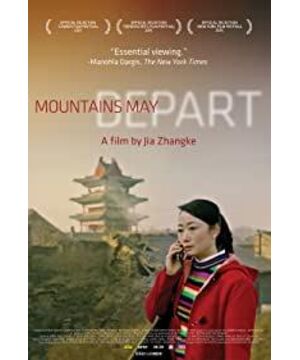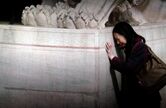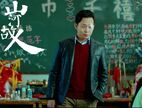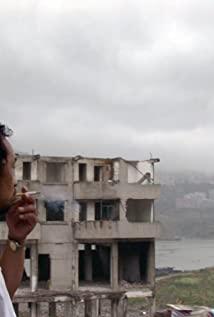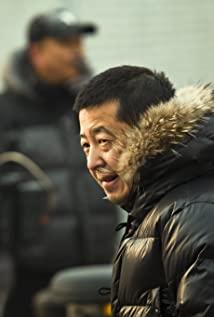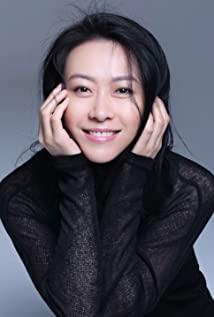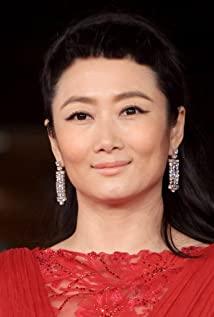Roughness, grayscale, humanistic care, and close-to-real documentary are the consistent artistic styles of Jia Zhangke's films.
Starting from "The Hill Going Home" by the "Youth Film Experimental Group", it has continued to "Xiao Wu", "Platform" and "Ren Xiaoyao".
Compared with the popular critical realism works of the 1980s and 1990s, Jia Zhangke's film narratives are much more calm and restrained.
In his films, there has never been a moral prejudgment from the perspective of God, and he has always used a real, rough, and distinctive documentary style to allow viewers to examine the film from a parallel perspective, as well as to look at the real world.
When the Chinese film collective surrendered to the Western film market led by Hollywood, engaged in "local criticism", and immersed in illusory and non-realistic themes.
We can easily see that his films never shy away from reality and human relations, and his humanistic attention to real life also makes his films completely different from other domestic directors:
Jia Zhangke never engages in mystical things, and does his best to record the real situation of China's social development process.
It shows the details and temperature that history never tells us, and in the cold and severe reality, it always maintains a different kind of warm style.
In the past 10 years, he has used a unique lens language to record a rapidly transforming and developing China.
It also depicts the price and fate that the times impose on an ordinary person's body during a period of great social change.
Jia Zhangke's cinematography is gradually becoming a new way for the West to understand China, and he is also redefining the realism of Chinese cinema.
Although many domestic film critics and media people are accustomed to taking the same stand, accusing him of using his films to expose the dark side of society and flattering people in Western countries.
However, the crude documentary and humanism of Jia Zhangke's films has made him a special hero among the domestic director group, and firmly holds the top spot as the leader of the sixth generation of directors.
In the work "Tian Destiny", Jia Zhangke tells the audience a story of revenge and revenge based on the stories of the villager Dahai, the killer San'er, the massage shop Xiaoyu, and the migrant worker Xiaohui.
If you describe the look and feel of "Tian Destiny" as willful and wild, immediately drawing a knife, neat, and hearty.
Then Jia Zhangke is obviously more forbearance and subtlety in "The Old Man in Mountains and Rivers", using Shen Tao, Liang Zi, Jinsheng, and Dale to fall apart for half a century to express the lonely sigh that the mountains and rivers are no longer and the old man has passed away.
At the end of 1999, Shen Tao, an optimistic girl in Fenyang County, Shanxi, was carrying out a rehearsal for the end of the year. At this time, she obviously had more than one trouble:
The coal miner Liang Jianjun and the small boss Zhang Sheng are pursuing her in their own way.
The unstable relationship between the three ended when Shen Tao chose Jin Sheng. When Shen Tao and Jin Sheng were happily married, Jin Sheng, who was lost, carried a backpack and left the land of life forever.
In 2014, due to working in a coal mine for a long time, Liang Zi fell ill and his health was almost irreparable.
In the last years of his life, he returned to his hometown in Fenyang with his wife and children. At this time, Jin Sheng and Shen Tao had already divorced, and Jin Sheng brought their son to Le to live in Shanghai.
Shen Tao started a gas station business in his hometown in Fenyang. When people reach middle age, they inevitably reach the boundary of life and death.
In 2025, Jinsheng's son Zhang Daole will grow up. At this time, he does not speak his native language, and the emotional estrangement between him and his father, who can only communicate with him through Google Translate, is getting deeper and deeper.
Long-term alienation from his native language environment made him and Chinese teacher Mia attracted to each other, and the relationship got closer and closer...
In this film, Jia Zhangke put away the rough and tit-for-tat, and used a relatively gentle and stable rhythm to combine the fate of the individual and the country, and use the film as the umbilical cord of time.
With the turn of the century, the disappearance of the old, and the view of the hometown across the ocean, these three historical stage plays present the audience with a spatial picture of the period of great social transformation under the rapid development of the country.
turn of the century
Geometry or Algebra
In the movie, Shen Tao asked Liang Zi, "What relationship do we have, an algebraic relationship or a geometric relationship?"
At first listening, the viewers are confused, but if we think about it carefully, we will understand her words, which will become the prediction of the future fate of the three people.
Roland Barthes believes that there is important information hidden in symbols, and if we want to understand their relationship, we must understand the deep meaning of geometry and algebra.
Geometry represents spatial structure, algebra represents numbers and growth, and Shen Tao is China in isomorphism. Every choice she makes is actually the direction China has chosen.
Liang Zi and Jin Sheng have very different family conditions:
Jinsheng runs an oil business and can even buy an entire coal mine. There is only one person in Liang Zi's family, and it is not an exaggeration to describe him as a family with four walls.
Two people with such a huge disparity in strength competed for one person, and Shen Tao chose Zhang Jinsheng, who was from a wealthy family, unsurprisingly.
We will be a little puzzled when we see this. The movie clearly shows that Shen Tao and Liang Zi are more intimate. Why did the plot suddenly turn, making Shen Tao completely biased towards Zhang Jinsheng.
If we substitute the national conditions of the 1990s, we will find it very reasonable:
Liang Zi has no big plans for life. His wish is to work in the coal mine for a lifetime. Even if Jin Sheng asked him to become the factory manager, he would refuse him as incompetent. Liang Zi represented the conservative, poor, backward, and inept in the past. poor country.
Jinsheng has unshakable ambitions for money and an urgent desire to get rich, so Jinsheng is not afraid of tossing and daring to venture out.
In the 1990s, China's old energy iteration period came. The profits of coal mines decreased year by year, oil became the darling of new energy, and Chinese oil companies also went public as the millennium approached.
With the smooth progress of the 15-year negotiation between China and the WTO, all walks of life in society have ushered in new vitality. As long as it is an industry that makes money, Chinese people will be involved, and this aggressiveness has also brought huge profits to itself.
Zhang Jinsheng, like a hard-working Chinese, has opened coal mines, oil stations, and venture capital. He represents a new society in the future with vitality, wealth, openness, ambition, direction, and opportunities.
In essence, Shen Tao's personal destiny and China's future direction have all changed in the last Spring Festival of the millennium. Facing the same fork and intersection, they have no accident to seek advantages and avoid disadvantages, and make the best choice. s Choice:
Shen Tao chose Zhang Jinsheng, China chose future opportunities, and their relationship changed from triangular geometry to algebraic economic growth!
Divorce
Shen Tao's Middle Age Frustration and Social Pain
In 2014, the absolute protagonist of this stage play is Shen Tao, who has been divorced for many years after being frustrated in middle age.
He opened a gas station in Fenyang by himself, and Jin Sheng had long been living in Shanghai with his son, and it would be a matter of time before there were no accidents.
Her situation has undergone earth-shaking changes, and what she has to face is no longer the prosperity of the millennium, but the constant parting and passing away.
It was Liang Zi who said goodbye to her first. The illnesses accumulated in the mine brought Liang Zi's life to an end, and the last part may be a farewell;
Then came her father, who was about to go to the appointment of a comrade-in-arms, but died hastily in the waiting room of the railway station, and she didn't even have time to say the last word to her father.
The successive farewells of relatives and friends made Shen Tao realize the aggravation of the death of the deceased. When she saw her son Zhang Dale this time, the hysteria at the funeral was a vent to her frustration and loneliness.
Finally, when Zhang Daole asked her when she was young, "Why is the train we take so slow?", she would say this meaningful sentence, "The slower the train, the longer your mother will spend with you."
From Zhang Zhile shouting to her for Mommy, to the mother and son wearing headphones in the train who were relatively silent, it was at this time that Shen Tao realized that even if it was close relatives, it was still related to alienation. in the back.
In 1925, Baird successfully developed the world's first TV set in the UK for the first time;
In 1954, WNBC, the New York City branch of the National Broadcasting Corporation (NBC), became the first television station in the world to launch color television.
In 1969, the United States was born due to the military ARPANET, and the prototype of the first-generation Internet began to take shape.
In 1973, the first computers designed by Xerox Otto for personal use appeared, and Motorola of the United States invented the personal mobile communication device - Big Brother.
In 1994, the world's recognized first smartphone, the IBM Simon, was launched.
In 2016, Google's VR Eyes came out.
The rapid development of science and technology in the world is beyond human imagination. Since the millennium, Chinese society has also undergone earth-shaking changes.
With the rapid economic growth, problems left over from the past and new problems emerge in an endless stream (you know it), and while the society enjoys the fruits of rapid economic development, it will inevitably suffer the throes of social transformation.
In a period of great social transformation, there will be winners, and there will naturally be losers.
More generally speaking, most people belong to ordinary people who are surrounded by the times, and we are like wading through water in chaos.
Don't know how to put anxieties about survival, and don't know which future society will lead us in!
There has always been a cruel joke on the Internet. When the times abandon you, they will not say hello to you.
Jia Zhangke here gives the diametrically opposite statement: When a society is in a hurry, it cannot ignore the person who was knocked down by you just because you want to move forward.
In a sense, she is someone who has been knocked down by the times. She has caught up with the economic take-off of the millennium, and she has also encountered the throes of social transformation in the early 21st century. Like most ordinary people, in the unknown Worry about gains and losses in anxiety, frustration and melancholy!
The conversation on this train was not so much her nostalgia for her son as she was trying her best to keep her old friend after she felt the passing of her.
She wants everyone to remember her for a longer time, and for a longer time, like most ordinary people, she also hopes that society will go slower, so that she has a good chance to take a break.
Looking across the ocean
Zhang Daole's lack of mother tongue culture
After 2025, Zhang Dale, who grew up in Australia, has no idea what his native language is, so that he and his father Zhang Jinsheng cannot communicate in his native language, and can only use Google Translate to assist in communication.
This cultural gap, which cannot be bridged by blood, finally made the father and son face opposites: the lack of maternal love since childhood prompted Zhang Dale to fall in love with his Chinese teacher of Chinese descent, Mia.
In the movie, the age difference between Mia and Dale is at least 20 years old. This kind of love affair is extremely rare in the traditional Chinese cultural environment.
Many people are saying that Jia Zhangke arranged this episode for the orthopaedic tendencies of European audiences, but I think he set up this episode in the future of 2025, which is more of an allegory for the reconstruction of social morality in the future.
To Le, dollar dollar, Jia Zhangke has hinted clearly enough in the movie:
The combination of Shen Tao and Jin Sheng gave birth to the next generation of Zhang Dale. The opportunity chosen by Chinese society has brought the development of the US dollar and the economy, and has also spawned the fever of studying abroad, tourism, international intermarriage and investment immigration.
If we look closely at the second generation and even the fourth generation of Chinese, we will find that they are the same as the Chinese except for their skin color.
Living habits, ways of doing things, and even mental outlook will be completely different from those of terrestrial Chinese.
This difference is the dominant phenomenon caused by the individual's long-term alienation from the parent culture.
When Zhang Dile became an adult, he still kept a key given to him by his mother, and still thought of returning to China to be reunited with his mother one day.
Unfortunately, at the end of the movie, he didn't wait to return to the mainland to see his mother Shen Tao, and finally Mia asked him "if we see her, how would you introduce me to her, your teacher? friend? sister?".
Zhang Dale was speechless and couldn't answer for a while. He didn't know how to mention his new girlfriend to his mother, who had not seen him for decades.
Today, when aerospace technology has developed, distance is no longer a problem. What makes him unable to meet his mother indifferently is the alienation caused by the cultural environment.
His situation also corresponds to the real situation of most immigrant Chinese in reality.
The long-term absence of the mother culture has long removed it from the category of Chinese people, but in the depths of their souls, there is some kind of cultural induction.
Zhang Daole felt the existence of the mother culture in the surging tides of the sea. At the same time, this is also an inductive connection of the new generation of immigrants to the culture of the motherland .
4:3 16:9 2.39:1 , over the past few decades, the size of the movie screen has continued to expand. Jia Zhangke has composed a stage play of great social changes in China between the centuries with three widths.
Although the movie poster slogan is about meeting old people and seeing the mountains and rivers unchanged, in fact, the ending of the movie is the same as that of real China, slowly moving towards the long-established "mountains and rivers are no longer, and things change over time".
Tao's loneliness and loneliness, as well as the loss and anxiety of the times, are comforted in the disco "Go west" in the 1980s.
View more about Mountains May Depart reviews


